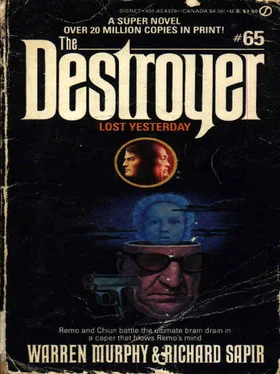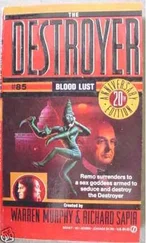At the FBI office, the prints arrived by messenger after Captain Polishuk was dead.
A report was filed, but the word came back: Polishuk's discovery of a dead man's prints was not so unusual in the last twenty years. Similar prints had been discovered elsewhere, but every time the case was investigated, it was shown the real holder of the prints was dead and buried many years ago.
Unless one was a practicing Christian, one had to admit the dead did not rise again.
Beatrice Dolomo woke up to see an American aircraft carrier off the eastern side of her island, along with American patrol boats spitting white foam trails behind them, their guns trained on her island and on her.
This was too much. Especially when international terrorists had dared to take credit for obliterating Bayonne, New Jersey.
“We are surrounded, isolated, and ignored. Rubin, I have come to a conclusion,” said Beatrice in the main house of Home Island Lodge, waiting for her breakfast of fried grouper and bananas.
Rubin coughed out the smoke of his first cigarette of the day. It was noon. He had just woken up and taken the cotton out of his ears. He needed the cotton here because the place was filled with Powies now, and one of the ways they showed they had overcome their negativity was by greeting the sun. Since many of them had paid for the course that got them away from “lazy body syndrome,” none of them wanted to show they hadn't overcome that negativity.
Which left Rubin with an island full of chirpy six a.m. lunatics.
Cotton out, phlegm making its way around his lungs, Rubin listened to Beatrice.
“Rubin, I have come to the decision that we are not taking it anymore.”
Rubin nodded. The phlegm came out like a tidal wave. Beatrice turned away in disgust.
“No more nice guys for us. Our only problem is that we've been too soft.”
“Dearest dove,” said Rubin, “I guarantee we will not be ignored after today.”
“Don't play softy.”
“You'll be happy, dear.”
“Can you imagine an entire city destroyed and not a word about the persecution of our beliefs, about poor Kathy Bowen, about us, about me? Me, Rubin. Not a word about me.”
“By tomorrow there won't be a household in America unaware of how you have been mistreated.”
“Television?”
“I promise.”
“A chance to trash that bum President who won't make a deal?”
“You'll have help.”
“You're not just getting my hopes up, are you?”
“The Warriors of Zor are ready.”
“And I'm the queen.”
“Right,” said Rubin.
“But that doesn't make you king.”
“Right, dear.”
“Don't fail me, Rubin,” said Beatrice. “Don't fail our marriage.”
“You said you wanted us to be heard. You didn't say sex, dear,” said Rubin, worried. He looked at his watch. His plan was beginning. He walked down to Pink Beach with his commanders, one of whom fortunately happened to be an engineer.
The beach had a faint pink tinge because of the crushed red coral mingled with the sand. It was most noticeable as the sun broke, coming up from the European side of the world, making the Caribbean blue into a delicate pastel mirror.
A few Bahamians had private homes on the beach. These had been commandeered by his Powies. A rumor had gone around among them that the decrepit middle-aged man with the smoker's hack was Rubin Dolomo himself, which caused some of those who had purchased the “Be Free of Nicotine” course to feel some doubts. This was quickly squashed by the informers, who reported the doubters to the counselors.
Ordinarily the counselors would work out the negative feelings of Powies, but now there was an easier way than tracing back through one's life to find where the negativity deposits were. Several strong men threw those in need of retraining into a small cabin with bars and beat them until they apologized for thinking such thoughts.
The cabin was hot, and in the Caribbean sun it smelled rancid. Even without the beatings the Powies who dared think such seditious thoughts would have changed their minds about the man with the cigarette cough.
Rubin asked the engineer if he thought Pink Beach would do for the landing.
“It depends how fast they'll be going. You might be able to bring it in. But what about them?” asked the engineer, nodding to the patrol boats cruising on the Atlantic side of Harbor Island. Above them Navy tomcat fighters flew close formations, letting the island know that whenever they wished they could bomb and strike, but that they chose not to do so at this moment.
This little island was in the palm of the American Navy and was being reminded of it constantly. Rubin had shrewdly ordered more consciousness sessions to remind Powies the aircraft were only an illusion of power. They themselves, in themselves, were the real power. They had to have a lot of sessions because Navy jets breaking the sound barrier every twenty minutes were hard to call an illusion.
“Don't worry about the planes or the ships or the guns. They won't matter.”
“I hope you're right,” said the engineer, who had been having headaches until he joined Poweressence and had learned that keeping his eyes closed a half-hour a day while concentrating on his power source would relieve him of the pain. His own doctor had said this was a standard way of relieving some minor forms of headaches. But ever since he had joined, he felt better about everything, especially when counselors would listen to his problems and help him trace them, reminding him that he was good in himself.
Like a true Powie he refused to listen to those who said it was just amateur therapy and group mind control.
It was the one thing in his life that seemed free of everything, free of all the constraints of his entire life. But looking now at the two-mile strip of beach and the naval power all around them, he had doubts whether the man who had made him a Warrior of Zor could pull it off. Even this man, this great mind in a poor frail body hacking up the results of four packs a day of unfiltered cigarettes, could not make the beach larger, or the U.S. Navy disappear.
“Don't worry,” said Rubin. “It'll work. It'll work like it's always worked. It works all the time. That's not the problem.”
“If that's not the problem, what is?”
“What I'm going to have to do if it doesn't.”
The engineer shuddered. No matter how frail this man looked, he was a genius of organization. Whether it came from his thoughts about planets the engineer did not know. But the man understood what great generals knew about reinforcing and contingency plans. What bothered him was that there was nothing that seemed to bother Rubin Dolomo, since he came out from behind the screen and told the engineer that now he and other Warriors of Zor could know his true identity.
* * *
He kept telling himself that his fear was the negative voice from the past. He saw that his partner, too, was trying to get in contact with his positive self.
Perhaps because he had been a classics scholar, Robert Kranz felt especially nervous this day. Athens, Greece, had once been the center of Western intellectual thought. But that was twenty-five hundred years ago.
Now it was home to revolutionary groups and had an airport that was, to hijackers, what an engraved invitation was to a dinner guest.
Robert Kranz and his fellow warrior in the cause of Poweressence had a choice of either bringing the weapons on board the plane and stashing them, or buying them outside the open gate from a dissident group of Palestinians who had seized the concession from the Red Army Brigades of Revolution.
More hijackings had originated in Athens, the Arab assured Kranz and his companion, than any other airport in the world.
Читать дальше



